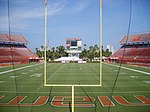The Miami Orange Bowl was an outdoor athletic stadium in Miami, Florida, from 1937 until 2008. The stadium was located in the Little Havana neighborhood west of Downtown Miami. The Miami Orange Bowl was considered a landmark and served as the home stadium for the Miami Hurricanes college football team from 1937 through 2007 and for the Miami Dolphins for the Dolphins' first 21 seasons until Joe Robbie Stadium, now Hard Rock Stadium, opened in nearby Miami Gardens in 1987. The stadium also was the temporary home for the FIU Golden Panthers for one year, in 2007, while its on-campus venue, now known as Riccardo Silva Stadium, underwent expansion
Originally known as Burdine Stadium when opened in 1937, the stadium was renamed in 1949 for the Orange Bowl college football bowl game, which was played at the venue following every season from 1938 to 1996. The event was moved to Pro Player Stadium (now Hard Rock Stadium) beginning on December 31, 1996. In January 1999, it returned to the Orange Bowl a final time due to a scheduling conflict. The Minor League Baseball Miami Marlins team occasionally played games in the Orange Bowl from 1956 to 1960.
The stadium was located on a large city block bound by Northwest 3rd Street to its south, Northwest 16th Avenue to its west, Northwest 6th Street to its north, and Northwest 14th Avenue to its east, which was an open end of the stadium.
The Orange Bowl was demolished in 2008. LoanDepot Park, the home ballpark of the Miami Marlins of Major League Baseball, was subsequently constructed on the grounds of the Miami Orange Bowl. LoanDepot Park's construction began in July 2009, and the new stadium opened March 5, 2012.






